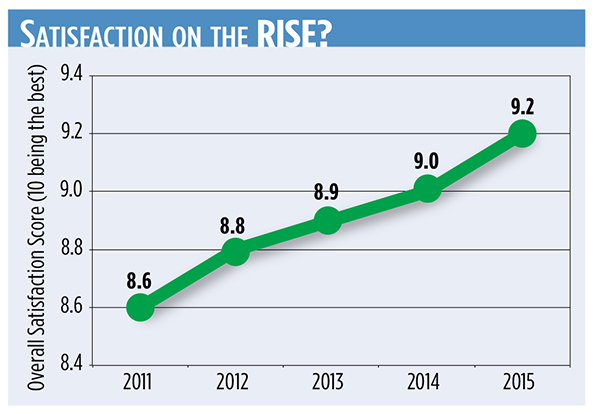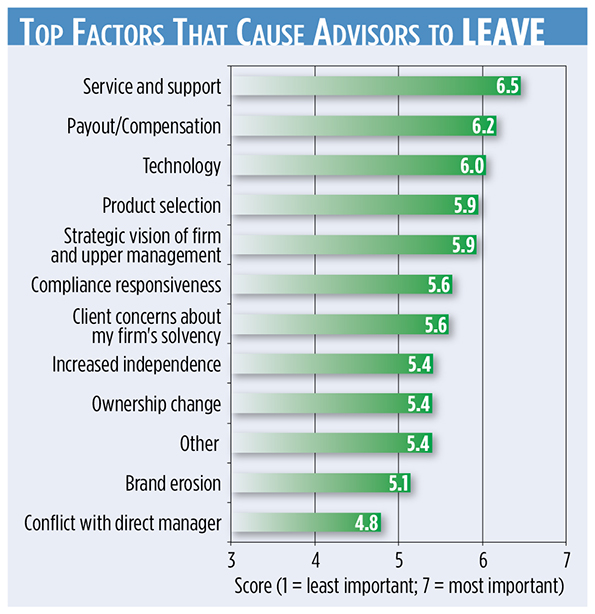There’s a reason travellers will generally rank Ritz-Carlton, which owns just 87 hotels worldwide, over many of those owned by Hilton, which oversees 4,000.
Bespoke service, attention to detail and easier access to decision-makers—in the hospitality industry as well as among independent broker/dealers, size matters. Generally speaking, the smaller the firm, the happier the broker, according to our fifth Independent Broker/Dealer Report Card survey. As scale increases from 250 reps to 14,000, it becomes more difficult for firms to manage each individual relationship to that advisor’s satisfaction.
The survey asks advisors from independent brokerages to rate the firms they work with from 1 (unacceptable) to 10 (outstanding) on a number of factors, including service, technology and practice management. Advisors from the six largest b/ds scored their firms lower on overall satisfaction—8.8—than smaller b/ds with less than 2,000 advisors who, on average, gave firms a satisfaction score of 9.4.

Size Matters
“There’s large and super-large. Supersizing seems to be the issue. If you’re wearing the XXL jersey, that’s when you start having issues,” says Philip Palaveev, founder of the Ensemble Practice.
Comparing just the larger firms, Commonwealth Financial Network is clearly leading the pack, earning a 9.8 on overall satisfaction, followed by Raymond James Financial Services with a 9.3. LPL Financial, the largest of the independent broker/dealers surveyed, came in with a 7.9, a slight increase from the 7.8 the firm earned last year.
LPL has suffered a number of executive departures and compliance stumbles over the past year, and earned generally lower scores than its counterparts in areas like the quality of its sales training, its lending and investment banking capabilities, and its client relationship management technology. LPL also scored lower than others when advisors were asked about how their brokerages helped with reducing the burden of compliance.
“Where we see firms at risk are those that have taken the advisor for granted, those that haven’t updated their affiliation model in a lot of years or updated their products,” says Matt Lynch, managing partner at Strategy & Resources.

LPL may have scored lower than other firms, but it’s important to remember that’s on a relative basis, and firms that scored higher did so only marginally. Overall, advisors at IBDs big and small are a satisfied group—not surprising, given the reps choose to work there.
“Advisors have a tunneled view and perception because they can only test-drive so many firms in their careers. They get told how much better the next firm is, but do they really know?” says Alois Pirker, research director of Aite Group.
Satisfaction on the Rise?
The average rating was 9.2 across all 19 firms participating in the survey. Some increased their overall satisfaction scores—Voya Financial’s advisors gave the firm an 8.7 this year, compared to last year’s 7.2, prior to the firm’s restructuring and rebranding.
In fact, the overall score has risen steadily over the past few years, helped by some smaller firms that scored exorbitantly high; New Jersey-based The Investment Center came out on top with a perfect 10. This is the first year that the firm, which has 269 advisors and $6.1 billion in assets under management, qualified for the survey.
“Their service is pretty awesome and the people that work there get things done,” says Clinton, N.J.-based advisor Lou Tranquilli. “They know who you are.” He says he appreciates the easy access to home office help like Investment Center’s Adam Handler, who does due diligence reviews on investment products.
Is it possible that satisfied reps from smaller firms are simply more motivated to give unadulterated praise, without the results getting diluted by a larger number of responses like those coming from the bigger brokerages? “It’s become a beauty pageant,” says Palaveev.

Yet advisors from each firm were afforded the same opportunity to access and respond to the survey. Clearly, size does matter to overall advisor satisfaction, at least in terms of support. “Scale is the enemy of service,” Palaveev says. “What creates profitability the most is scale, but what creates great relationships is personalized attention. The most efficient restaurant in the world is McDonald’s, but that’s not where most people go on their anniversary.
Top Factors That Cause Advisors To Leave
“If you look at what reps are telling us is the single biggest reason they leave a broker/dealer, the answer is always service,” Palaveev says. This year’s survey results bear that out, as advisors rated service and support as the factor most likely to cause them to look for a new b/d.
But service is a nebulous category. What really differentiates one firm from another, especially as many of the firms in this year’s survey ranked within tenths of a point of each other?
“Differentiation is increasingly difficult, because everyone seems to have that same baseline list of services and technologies,” says Kenton Shirk, associate director at Cerulli Associates, adding that the differences between firms tend to be more qualitative.

Key Differentiators
Providing reps with help running their businesses is one place where firms can really stand out, Palaveev says. But that goes beyond holding an annual conference with breakout sessions, he adds. “It has to be more than a few speakers and a white paper available on the firm’s website.”
Firms that do it well have one-on-one consultations with advisors, bringing their reps tailored advice and continuous learning opportunities. Commonwealth Financial Network, Independent Financial Group and NFP Advisor Services all received high marks from advisors on their practice support and professional development services.
The rollout of RIA platforms for advisors to work under is also a key differentiator, says Shirk.
Many firms that rolled out corporate RIAs did so because they believe it gives them an edge in recruiting, he says. By positioning themselves as “RIA-friendly,” firms provide advisors with options to roll out investment advisory services if they so choose. “That’s an appealing message, and I can see a growth-oriented advisor thinking he might want to go RIA, but not in the immediate future,” Shirk says.
Succession planning is another area where top firms set themselves apart. Only 38 percent of advisors at IBD firms have written policies and procedures in place, according to WealthManagement.com’s recent All-Channel Advisor Benchmarking report. So advisors look to their IBDs for help in making transition plans.
Raymond James has done a good job in this area, Lynch says, noting the firm has a team that helps advisors find potential successors, as well as offering support with funding and execution when the time comes. “It’s in their best interest to retain those practices,” he adds. The firm received an 8.8 (out of 10) on the quality of its succession planning.
But NFP Advisor Services topped Raymond James with a 9.6 out of 10 in succession planning. In addition to the baseline resources offered to advisors, the firm gives its advisors a comprehensive report of their preparedness, practice valuations and options.
“At the end of the day, if, as a broker/dealer, you help an advisor sustain and grow their business and make good business decisions, that differentiates you,” Lynch says.
Next: The Rare Prop Product




